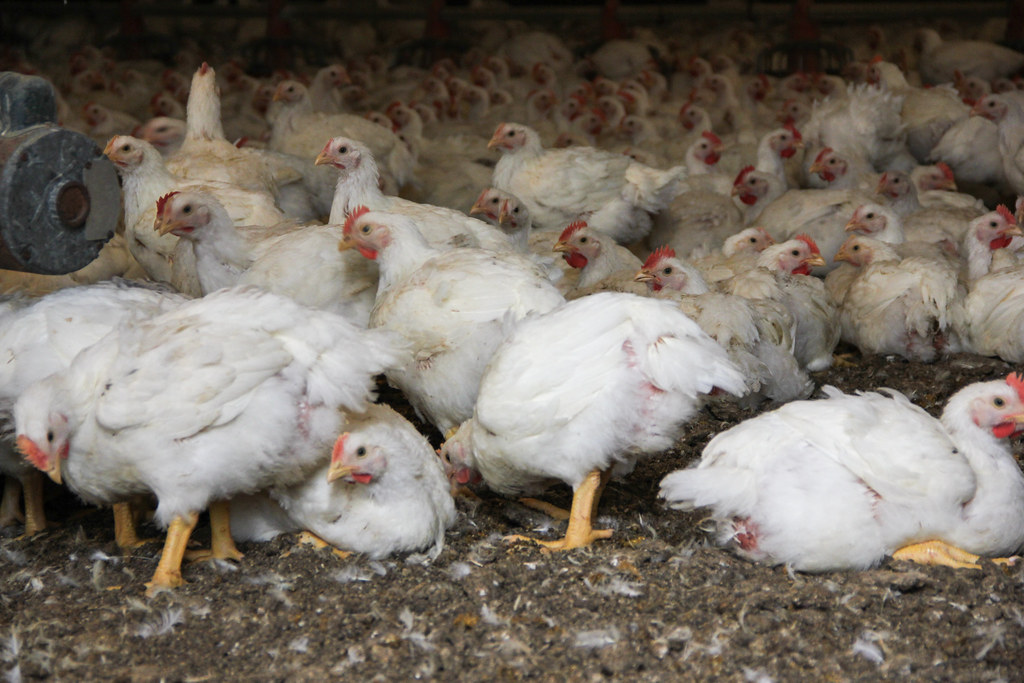Denae Romero is a law student at the University of California, Los Angeles School of Law and is a guest contributor to this blog. She was an intern in the Harvard Law School Food Law and Policy Clinic during the summer of 2024.
Passed over 100 years ago, the Packers and Stockyards Act (codified at 7 U.S.C. §§ 181-229) aims to safeguard ranchers and farmers from unfair, deceptive, unjustly discriminatory, and monopolistic practices by meat packers. However, despite years of advocacy, this Progressive Era legislation still requires much progress to resolve the unfair and deceptive practices that plague the poultry industry.
What is the “Tournament System” and How is it Unfair and Deceptive?
Approximately 93% of poultry grower contracts with Live Poultry Dealers (LPDs) are based on a relative performance payment system known as a “tournament system.” Poultry growers are contracted for a base pay rate per pound of poultry they produce, but that rate is subject to a calculation adjustment based on the grower’s “efficiency” relative to other contracted poultry growers in the area. Growers who are more efficient than the average grower in the tournament settlement group receive a bonus above the base pay rate, while LPDs deduct a discount from the wages of growers who produce below the average.
The tournament system’s bonuses and discounts create a stable cushion for LPD production losses at the cost of the grower’s stability. The unpredictable discounts and bonuses make grower wages volatile, affecting their ability to pay off loans and rely on their income to provide for themselves and their families.
In addition, the tournament system’s comparative nature is unfair given that LPDs manage and control the inputs (birds, feed, etc.) the growers use and often these inputs vary between growers, whether intentional or not. The variation of inputs affects the amount, size, and gender of the birds that growers produce, which determines the growers’ ranking, and consequently, their overall compensation. Lastly, LPDs often ask growers to make additional capital investments (ACIs), but fail to disclose key information about the true cost of the proposed ACI and the relatively low return on investment for the growers. Growers are put between a rock and a hard place because ACIs mean accruing more debt, but refusing to accept the proposed ACI can result in forfeiting a renewed contract.
USDA’s Current Effort to Mitigate Unfair Practices
The U.S. Department of Agriculture’s (USDA) Agricultural Marketing Service (AMS) acknowledges the unfair and deceptive consequences of the tournament system in the poultry industry and has proposed the “Poultry Grower Payment Systems and Capital Improvement Systems” rule as an update to the Packers and Stockyards Act. Here are three of the major proposed revisions:
- Broiler Grower Compensation Design (Proposed § 201.106):
Prohibits the reduction, or discounting, of any compensation rate under the broiler growing arrangement compared to other growers. If finalized, LPDs would be required to clearly define base pay in the contract terms. However, they would still be permitted to give bonuses based on competitive performance.
- Operation of Broiler Grower Ranking Systems (Proposed § 201.110):
Creates a general framework for how LPDs can compare between growers in a fair and transparent manner. It requires LPDs to distribute equal inputs in good faith and when inputs cannot be equal, to compensate growers through a non-comparison method. In addition, it would require LPDs to maintain documents that clearly lay out the design and procedures for their ranking system.
- Broiler Grower Capital Improvement Disclosure Document (Proposed §201.112):
Requires LPDs to provide a disclosure document to the grower about the requested ACI. This document must include reliable information on the justification for the investment, all relevant financial incentives and the compensation the grower can expect to receive, and an analysis of any assumptions, risks or uncertainties of projected returns the grower can expect.
What’s Next: Actions and Obstacles to Passing the Proposed Rule
The proposed rule was posted in the Federal Register for public comment on June 10, 2024. While the comment period was open for 60 days, some groups quicly made their opinion on the proposed rule loud and clear. The National Chicken Council’s President Mike Brown called the proposed rule a list of “solutions in search of problems that do not exist.”
A day after the rule was posted in the Federal Register, the House agriculture appropriations committee posted their most recent markup of the Fiscal Year 2025 bill and, if passed, it would specifically prohibit USDA from finalizing the proposed rule, as well as others that would remedy unfair and deceptive practices under the Packers and Stockyards Act. The ultimate outcome of the proposed rule will likely depend on the outcome of upcoming election.
The views and opinions expressed on the FBLE Blog are those of the authors and do not necessarily reflect the official policy or position of FBLE. While we review posts for accuracy, we cannot guarantee the reliability and completeness of any legal analysis presented; posts on this Blog do not constitute legal advice. If you discover an error, please reach out to contact@farmbilllaw.org.


